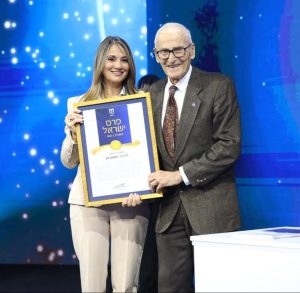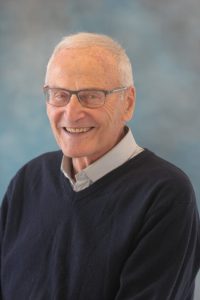Professor Emeritus Joshua Zak, 1929-2024
The Technion mourns the passing of Professor Emeritus Joshua Zak, one of the founders of the Faculty of Physics and recipient of the Israel Prize in Physics and Chemistry Research
Professor Emeritus Joshua Zak, one of the founders of the Technion’s Faculty of Physics and a recipient of the 2022 Israel Prize in Physics and Chemistry, passed away on March 14, aged 94. Professor Zak led scientific breakthroughs that led to significant applications. He was responsible for numerous achievements in physics, two of which are named after him: the Zak transform, which is used today in signal processing, and the Zak phase, a unique phenomenon in one-dimensional crystals, which he published in 1989 in the scientific journal Physical Review Letters. He completed his doctorate at the Technion under the guidance of Professor Nathan Rosen, a student and assistant to Professor Albert Einstein; and Professor Yoel Racah from the Hebrew University. Professor Zak was awarded the prestigious Wigner Medal in 2014 and was elected an honorary fellow of the Israel Physical Society (IPS) in 2018. In 2022, he was awarded the Israel Prize in Physics and Chemistry Research.
Zak was born in Vilnius in June 1929. When he was 12 years old, he was moved to the ghetto with his family and later endured forced labor camps and a concentration camp, where he lost both of his parents and two of his siblings. As a young teenager, he participated in the death march to the west; he was liberated by the Red Army, and immediately drafted into it, before he turned 16. Upon his release in 1948, he returned to Vilnius and began studying at a high school, completing his studies with excellence despite losing many years of study due to the war and military service.
In 1955 he completed his studies in physics with distinction at Vilnius University, and also became a kayaking champion in Lithuania. In the same year he began studying advanced studies in Leningrad. In 1957, he immigrated to Israel, was accepted to the Technion, and continued his PhD studies under the guidance of Professor Nathan Rosen. In 1960, he received a doctorate in science, spent some time at MIT, and then returned to the Technion, where he began teaching at the Faculty of Physics. Ten years later, he founded the Solid State Institute at the Technion and served as its head.
Technion President Professor Uri Sivan said: “Today we bid farewell to a distinguished scientist, one of the pillars of the Faculty of Physics at the Technion and a trailblazer in his field. His research work paved new paths in understanding fundamental phenomena in quantum mechanics and accelerated the development of important engineering applications. Professor Zak is counted among the pioneers who laid the foundations for theoretical physics in Israel. As a faculty member in the Physics Department, I had the privilege of knowing him well and engaging in fascinating scientific discussions with him. Professor Zak’s achievements earned him international recognition, and we were all delighted when he received the Israel Prize for Physics and Chemistry Research in 2022, a prize that he truly deserved.”
The dean of the Faculty of Physics at the Technion, Professor Adi Nusser, said: “Professor Zak was one of the founders of the Faculty of Physics, and one of its leaders. Beyond the quality science that emerged under his guidance, he made a significant contribution to the faculty. Professor Zak made important contributions to the field of physics, which earned him the Wigner Medal and the Israel Prize. Even after his retirement, the Faculty of Physics and its academic quality remained important to him until his last day. Until recently, he regularly visited the faculty and participated in all activities.”
The Israel Prize was awarded to Professor Zak on the 74th Independence Day of the State of Israel, in May 2022, for “developing mathematical tools such as the ‘Zak transform’ and ‘Zak phase,’ used for interpreting phenomena of electrical conduction in a magnetic field. These tools enable the prediction of materials with unique properties for building electronic devices.” The committee also emphasized that “his scientific contributions serve and will continue to serve in understanding the chemistry and physics of matter.”

2022 Israel Prize ceremony – former Minister of Education Dr. Yifat Shasha-Biton presenting the Israel Prize to the late Professor Joshua Zak. Photographer: Oded Karni / Courtesy
In 2023 the Technion’s Faculty of Physics held a special four-day international conference dedicated to Professor Zak. The conference, which focused on the relationship between topology and physics, was organized by Professors Eric Akkermans and Ari Turner. “Topology, like set theory, is an elegant field of mathematics that allows us to describe geometric shapes anywhere they occur,” said Professor Akkermans. “It’s surprising how dramatic the implications of some of these concepts can be on experiments. The conference, attended by around 200 people, mostly young researchers, brought together many of the leading physicists who creatively contribute to this topological revolution in the physics of condensed matter – a field in which Professor Zak was a pioneer.”
Alongside the scientific sessions, a special session was dedicated to Professor Zak. In this session, his former students recounted his role as a teacher and educator who dedicated much effort to the education of new generations of engineers and researchers, and his colleagues spoke of his groundbreaking work in the topology of condensed matter physics. According to Professor Akkermans: “throughout his career at the Technion, Professor Zak emphasized the importance of a vibrant and active research environment in the faculty to attract talented researchers. At the conference, we succeeded in meeting his criteria for excellence and camaraderie, both in the standard of the invited lecturers, including Nobel Prize laureates, and in the standard of participants. This demonstrated once again that the Technion is a beacon of excellence in physics.”
May his memory be a blessing.



